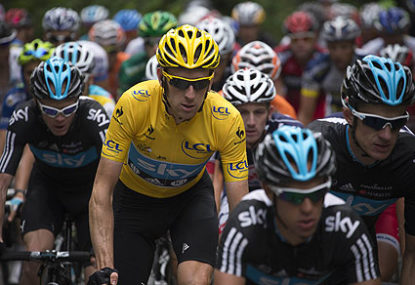'I've just won a stage of the Tour de France, mate!': Hindley grabs yellow jersey as Aussie blows Tour apart
Australia's Jai Hindley has said he is "lost for words" after a shock stage victory at the Tour de France earned him the leader's…

In memory of the recently passed cobbled classics, let’s reflect on what makes a winner, what a cobblestone is, and why it’s okay to be confused.
Firstly, the word cobble comes from ‘cob’, meaning ‘rounded lump’. It’s what I consider the most understating descriptor of cobblestones imaginable, setting the scene of an almighty shock for any unassuming freshman.
So why use stones for roads? Well, the easiest way to build a road is to just lay some stones, and so that’s what those farmers did. The Italians actually made cobbles quite pretty (search ‘Isola Bella‘), and treated them with care and courtesy. The French and Belgians didn’t care so much, and Paris-Roubaix follows these roads lain with randomly-placed lumps of bone shattering density.
Cobs are slippery too. They have an inherent lack of traction due to being smoothed over by generations of weather and wear, even the faintest smell of rain turns a cobble’s skin greasier than a pubescent cheek.
This slipperiness, even in the dry, is the reason Bradley Wiggins won’t win Paris-Roubaix. It’s the reason you can crash thrice in the one day of racing, the reason a medieval horse and cart would’ve had quite the ordeal fetching weekly groceries on a moist winter’s evening, and these are the reasons why the race is so fantastically unpredictable.
You will become further confused at this race upon discovering these stones are so large that one could contain up to five pints of beer (in theoretical volume). Considering this, it’s also bewildering how many lycra clad men proclaim annually how they desire to “battle forth!” over the series undercarriage-terrorising stretches of 18th century farm track. A cute throwback to the days where ‘masculine’ challenges bested mindful charm, but they wore armour not lycra.
Many a slang phrase rises whenever we speak of cobbles. “Power through,” is a cult leader, “barely grab the bars,” is another winner. Some dialogue I heard out the back of a bike shop recently:
A: “I heard you have to stay in the middle and just power through?”
B: “I heard you have to aim for the edge, it doesn’t matter if it’s grass, it’s smoother.”
A: “No, always avoid the edge, it’s muddy and you’ll crash.”
B: “I like the mud though, my background is mountain biking.”
A: “I spin, it’s more efficient.”
B: “I churn a big gear and just power through.”
A: “I barely grab the bars, I just activate my core and it’s like I’m hovering.”
Everyone has rules to riding over cobs. Some people look hilarious and ride fast (anyone from before the year 2000), some look hilarious and ride slow (GC contenders on cobbles in July).
General Classification riders have honed their physique with quite a different set of skills. This brings me back to why Bradley Wiggins can’t win Paris Roubaix, and the crux of the matter lay in his lack of acceleration.
A key feature that a Roubaix winner has over someone who specialises in 30-minute aerobic threshold efforts is acceleration, and specifically it’s assistance in more efficiently surviving the race with fresh legs.
Wiggins certainly challenged a few rules when he crossed from the black line of the velodrome to the hairpin’s of Ventoux, but the shift to Roubaix is another kettle of fish. The race’s stop-start nature may not have kept him from a top ten spot, but winning the race will require a grand shift in his repertoire of specialities.
Then there is cornering. The superior capability of Peter Sagan or Fabian Cancellara in handling their bikes through bunches and corners and an elbow-bashing crazes, is something that allows them to save energy all day long. Naturally sublime bike handling and acceleration, or, the ability to fill gaps in the bunch while using very little energy, is a massive factor allowing riders to be as fresh as possible in a finale.
The study of a victor from Paris-Roubaix is an interesting case and dissimilar to any other race. Naturally, ill-equipped racers in Paris-Roubaix will always be using too much energy battling for tight corners, remaining further back in the bunch so they are more prone to crashing, and wasting energy accelerating to regain position.
So what’s the point? Well, when you’re betting on who’s going to win Paris-Roubaix in 2015, just put your wallet back in your pocket and go next door for some cheap and manly take-out food. You still won’t be ‘winning’, but at least you won’t lose.